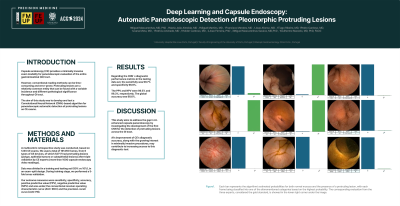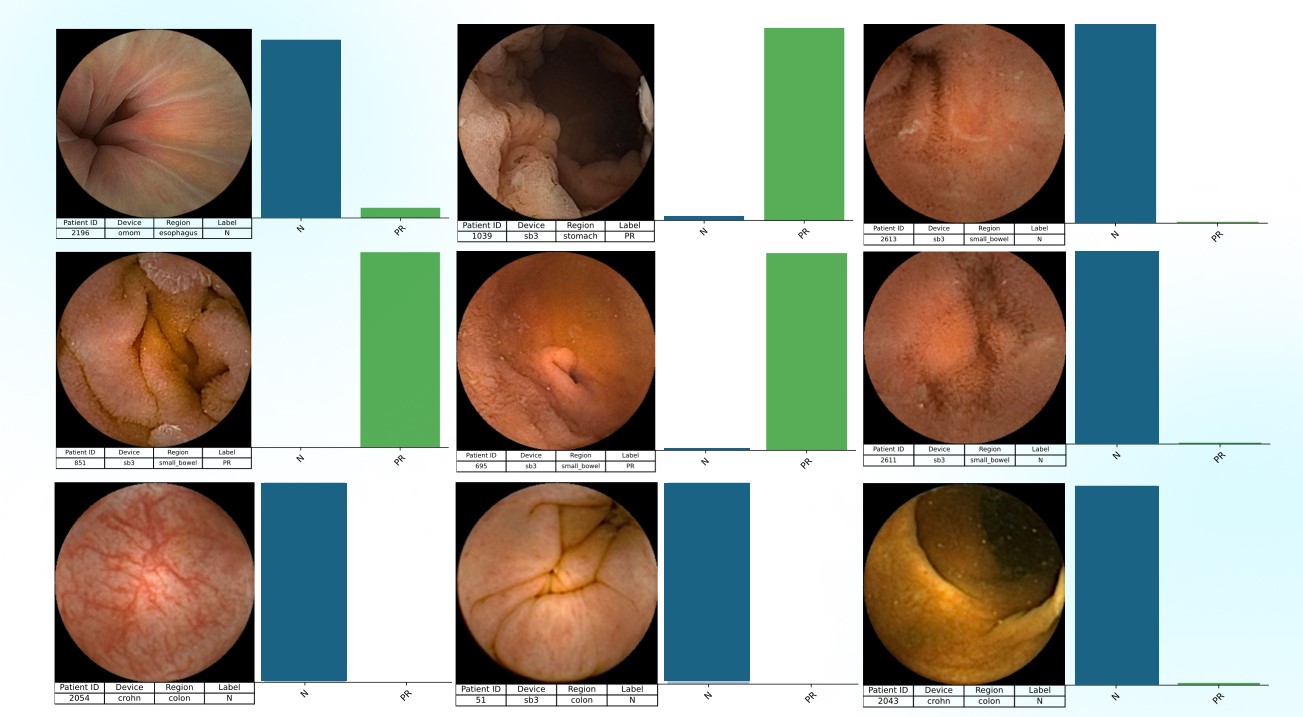Monday Poster Session
Category: Small Intestine
P3210 - Deep Learning and Capsule Endoscopy: Automatic Panendoscopic Detection of Pleomorphic Protruding Lesions
Monday, October 28, 2024
10:30 AM - 4:00 PM ET
Location: Exhibit Hall E

Has Audio

Miguel Mascarenhas, MD, PhD
Centro Hospitalar Universitário de São João
Porto, Porto, Portugal
Presenting Author(s)
Award: Presidential Poster Award
Miguel Mascarenhas, MD, PhD1, Maria João. Almeida, MD1, Miguel Martins, MD1, Francisco Mendes, MD1, Joao Afonso, MD2, Tiago Ribeiro, MD1, Pedro Cardoso, MD1, Joana Mota, MD1, Patricia Andrade, MD1, Helder Cardoso, MD1, Joao Ferreira, PhD3, Miguel Mascarenhas Saraiva, MD, PhD1, Guilherme Macedo, MD, PhD, FACG1
1Centro Hospitalar Universitário de São João, Porto, Porto, Portugal; 2Hospital Sao Joao, Porto, Porto, Portugal; 3University of Porto, Porto, Porto, Portugal
Introduction: Capsule endoscopy (CE) provides a minimally invasive exam modality for panendoscopic evaluation of the entire gastrointestinal (GI) tract. However, conventional reading methods can be time-consuming and error-prone. Protruding lesions are a relatively common entity that can be found with a variable incidence and different pathological significance throughout GI tract. The aim of this study was to develop and test a Convolutional Neural Network (CNN)-based algorithm for panendoscopic automatic detection of protruding lesions on CE exams.
Methods: A multicentric retrospective study was conducted, based on 1245 CE exams. We used a total of 191455 frames, from 6 types of CE devices, of which 52717 had protruding lesions (polyps, epithelial tumors or subepithelial lesions) after triple validation by CE experts (more than 1000 capsule endoscopy video readings). Data was divided in a training and testing set (90% vs 10%), in an exam-split design. During training stage, we performed a 5-fold cross validation.
Our outcome measures were sensitivity, specificity, accuracy, positive predictive value (PPV), negative predictive value (NPV) and area under the conventional receiver operating characteristic curve (AUC-ROC) and the precision-recall curve (AUC-PR).
Results: Regarding the CNN´s diagnostic performance metrics in the testing data set, the sensitivity was 99.7% and specificity 96.9%. The PPV and NPV were 99.5% and 96.3%, respectively. The global accuracy was 98.6%.
Discussion: This study aims to address the gap in AI-enhanced capsule panendoscopy by investigating the development of the first CNN for the detection of protruding lesions across the GI tract. AI's improvement of CE's diagnostic accuracy, along with the growing interest in minimally invasive procedures, may contribute to increasing access to this diagnostic tool.

Disclosures:
Miguel Mascarenhas, MD, PhD1, Maria João. Almeida, MD1, Miguel Martins, MD1, Francisco Mendes, MD1, Joao Afonso, MD2, Tiago Ribeiro, MD1, Pedro Cardoso, MD1, Joana Mota, MD1, Patricia Andrade, MD1, Helder Cardoso, MD1, Joao Ferreira, PhD3, Miguel Mascarenhas Saraiva, MD, PhD1, Guilherme Macedo, MD, PhD, FACG1. P3210 - Deep Learning and Capsule Endoscopy: Automatic Panendoscopic Detection of Pleomorphic Protruding Lesions, ACG 2024 Annual Scientific Meeting Abstracts. Philadelphia, PA: American College of Gastroenterology.
Miguel Mascarenhas, MD, PhD1, Maria João. Almeida, MD1, Miguel Martins, MD1, Francisco Mendes, MD1, Joao Afonso, MD2, Tiago Ribeiro, MD1, Pedro Cardoso, MD1, Joana Mota, MD1, Patricia Andrade, MD1, Helder Cardoso, MD1, Joao Ferreira, PhD3, Miguel Mascarenhas Saraiva, MD, PhD1, Guilherme Macedo, MD, PhD, FACG1
1Centro Hospitalar Universitário de São João, Porto, Porto, Portugal; 2Hospital Sao Joao, Porto, Porto, Portugal; 3University of Porto, Porto, Porto, Portugal
Introduction: Capsule endoscopy (CE) provides a minimally invasive exam modality for panendoscopic evaluation of the entire gastrointestinal (GI) tract. However, conventional reading methods can be time-consuming and error-prone. Protruding lesions are a relatively common entity that can be found with a variable incidence and different pathological significance throughout GI tract. The aim of this study was to develop and test a Convolutional Neural Network (CNN)-based algorithm for panendoscopic automatic detection of protruding lesions on CE exams.
Methods: A multicentric retrospective study was conducted, based on 1245 CE exams. We used a total of 191455 frames, from 6 types of CE devices, of which 52717 had protruding lesions (polyps, epithelial tumors or subepithelial lesions) after triple validation by CE experts (more than 1000 capsule endoscopy video readings). Data was divided in a training and testing set (90% vs 10%), in an exam-split design. During training stage, we performed a 5-fold cross validation.
Our outcome measures were sensitivity, specificity, accuracy, positive predictive value (PPV), negative predictive value (NPV) and area under the conventional receiver operating characteristic curve (AUC-ROC) and the precision-recall curve (AUC-PR).
Results: Regarding the CNN´s diagnostic performance metrics in the testing data set, the sensitivity was 99.7% and specificity 96.9%. The PPV and NPV were 99.5% and 96.3%, respectively. The global accuracy was 98.6%.
Discussion: This study aims to address the gap in AI-enhanced capsule panendoscopy by investigating the development of the first CNN for the detection of protruding lesions across the GI tract. AI's improvement of CE's diagnostic accuracy, along with the growing interest in minimally invasive procedures, may contribute to increasing access to this diagnostic tool.

Figure: Each bar represents the algorithm’s estimated probabilities for both normal mucosa and the presence of a protruding lesion, with each frame being classified into one of the aforementioned categories based on the highest probability. The corresponding evaluation from the three experts, considered the gold standard, is showed in the lower right corner under the image.
Disclosures:
Miguel Mascarenhas indicated no relevant financial relationships.
Maria Almeida indicated no relevant financial relationships.
Miguel Martins indicated no relevant financial relationships.
Francisco Mendes indicated no relevant financial relationships.
Joao Afonso indicated no relevant financial relationships.
Tiago Ribeiro indicated no relevant financial relationships.
Pedro Cardoso indicated no relevant financial relationships.
Joana Mota indicated no relevant financial relationships.
Patricia Andrade indicated no relevant financial relationships.
Helder Cardoso indicated no relevant financial relationships.
Joao Ferreira indicated no relevant financial relationships.
Miguel Mascarenhas Saraiva indicated no relevant financial relationships.
Guilherme Macedo indicated no relevant financial relationships.
Miguel Mascarenhas, MD, PhD1, Maria João. Almeida, MD1, Miguel Martins, MD1, Francisco Mendes, MD1, Joao Afonso, MD2, Tiago Ribeiro, MD1, Pedro Cardoso, MD1, Joana Mota, MD1, Patricia Andrade, MD1, Helder Cardoso, MD1, Joao Ferreira, PhD3, Miguel Mascarenhas Saraiva, MD, PhD1, Guilherme Macedo, MD, PhD, FACG1. P3210 - Deep Learning and Capsule Endoscopy: Automatic Panendoscopic Detection of Pleomorphic Protruding Lesions, ACG 2024 Annual Scientific Meeting Abstracts. Philadelphia, PA: American College of Gastroenterology.

